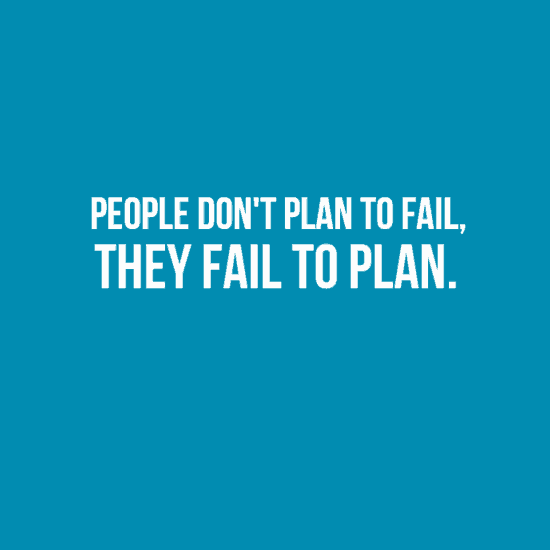
“People don’t plan to fail, they fail to plan.”
This was a favorite quote of my father’s. When it seemed as everything was going wrong; many times it was self-created. He liked to say this to me when I was being lazy or failed to put effort into getting things done efficiently or in a timely matter. This quote would put me in my place and gave me the realization that I had no one to blame, but myself.
Many of us look for excuses or deflect responsibility for situations we should own up to. We blame ourselves for mistakes, put off obligations and/or fail to provide adequate effort. This path is self-destructive and will not allow you to manifest the success you are capable of. Don’t let counterproductive decisions ruin your dream.
In sports, teams will always declare their intentions before each season. Making the playoffs, winning a championship, or whatever goal it may be, each team will make the appropriate strategic action plans to give themselves the best chance to succeed for that season.
Their “season” is comparable to the “decision” that you declared from last week’s blog. If you want your decision to be a success, now is the time to create an appropriate plan of attack.
Planning takes time and you must be able to self-assess yourself and your situation appropriately. “How am I going to do this?” “What is the most appropriate process to achieving what I set forth?” Answering these questions will bring you to the next level, preparation.
In order to properly prepare you may ask yourself the following questions.
- What information do I need to be informed with in my research process?
- Do I have enough credibility in my resume?
- Do I need to gather any extra material(s) to support myself?
- Do I have a good support system around me that is giving off positive energy?
- Do I need a coach to help guide and hold me accountable?
Once you answer these questions, and are planning and prepared for success, then you’re ready to start practicing.
Practice creates confidence. Confidence forms when you are sure of your abilities. Exercising your task in a repeated sequence creates confidence, as long as you are aware of what you’re doing. Sometimes I will ask my clients what they learned from their practice. If they are unable to declare their gains, I will know they lost focus of their original intentions.
Look forward to next week for the conclusion of my “6 P Process” in making your decisions a success. And if you haven’t already, check out last week’s post and video on how to make a decision (the right way).
By Shae McNamara, Elite Sports Clubs Performance & Wellness Coach